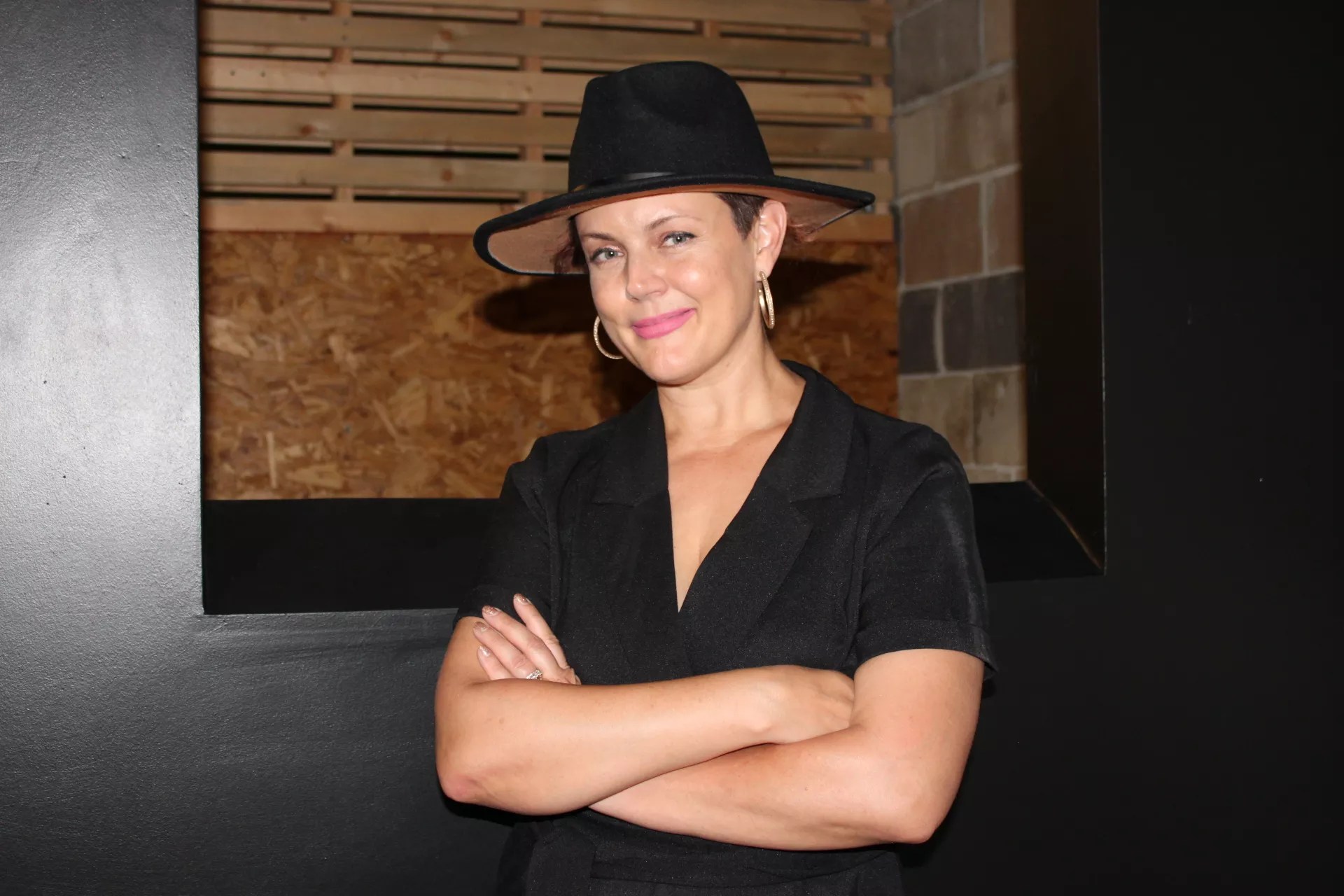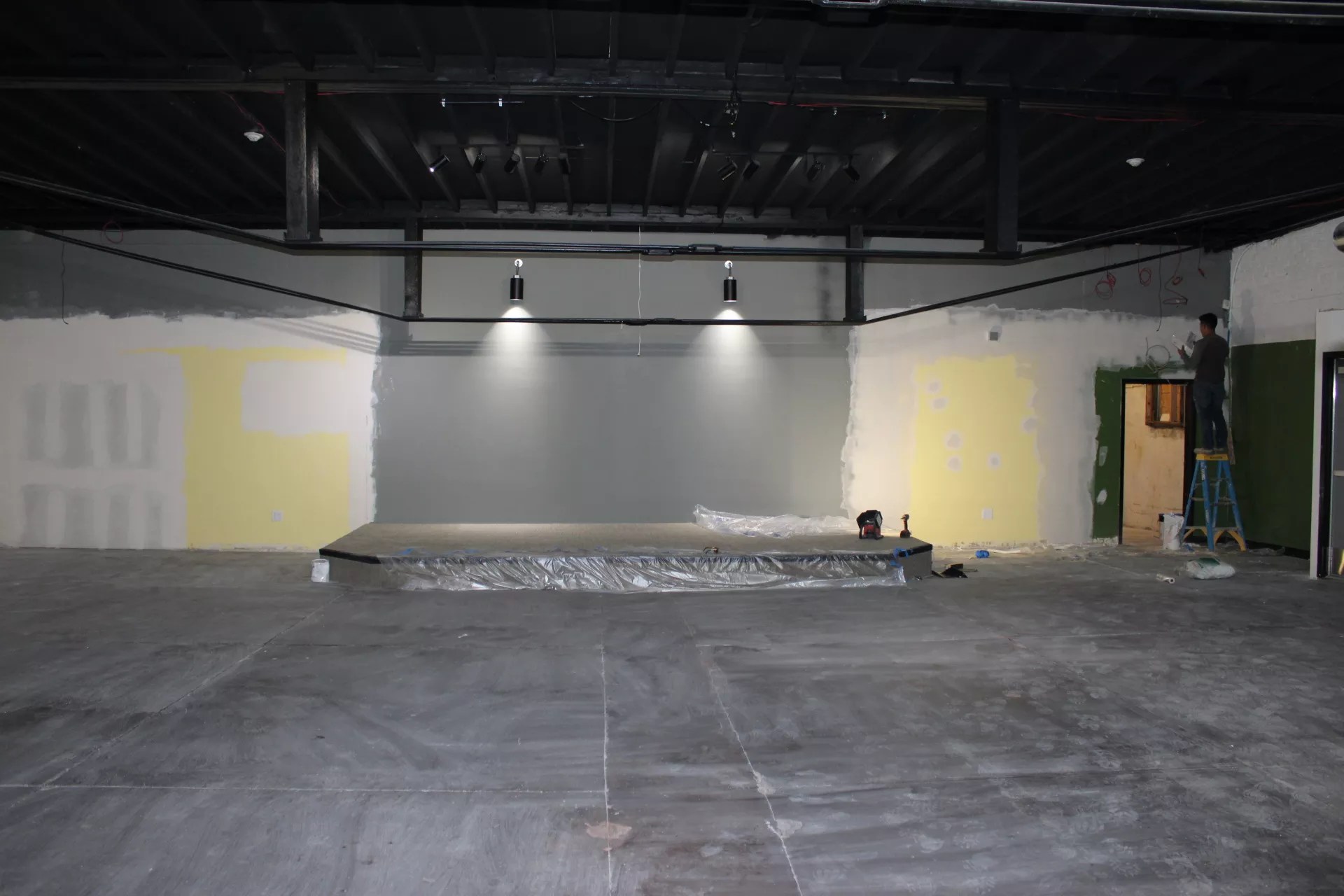
Toni Tresca

Audio By Carbonatix
It’s a clear, sunny afternoon in the Highland neighborhood, and the sidewalks hum with late-afternoon energy. Cyclists coast past moms pushing strollers, couples share meals on restaurant patios, and the sun casts long golden shadows across the block.
At the corner of 33rd and Tejon is Ballyhoo – a colorful, multi-use venue where art, caffeine, cocktails and community will soon converge. Producer Julia Tobey has transformed the former home of the BRDG Project into a space that’s part neighborhood café, part performance venue and entirely devoted to gathering.
“We believe this is a truly critical time to bring people together and celebrate humanity,” Tobey explains. “And we believe our new third space will save lives.”
Ballyhoo is intended to serve as both a daily neighborhood hangout and a thriving hub for performance and events. Tobey says she looked for the right spot for seven years before landing on Ballyhoo’s location. She has a five-year lease with the option to extend for another five years, and she hopes to purchase the building after ten years of operation.
Ballyhoo will hold a soft launch today, a BYOB karaoke night led by Tobey’s friend, composer David Nehls. When the place is officially open, the front coffee bar will serve Queen City Collective Coffee at 7 a.m., with cocktails starting at 8 a.m. “As soon as the city gives us a green light, we will open the bar and the cabaret space,” Tobey says. “That’s when we’ll officially be open for business, and then we’ve got a massive grand opening with our nonprofit partner, BRDG Project, planned for Saturday, September 27.”
The creative vision is expansive, but making Ballyhoo happen has required grit. The permitting process with the city has been long and complicated. “We had a food peddler license in process from March, and they were like, ‘No, you’re actually a retail food license,’ so we had to reapply,” Tobey explains. The liquor license, a key component of the business model, has also taken months to process.
“I’ve been a theatrical producer for thirty years, but I have never in my life dealt with as much paperwork as the City of Denver,” Tobey says. “The permitting process is also not easy. The exterior signage, for instance, is going to take six weeks before we can have it say ‘Ballyhoo.’ Right now, it still says, ‘BRDG Project.’ We’re going to put up a banner that says, ‘Ballyhoo coming soon,’ but if we put up any permanent signage, it’s a minimum of four weeks, probably six to eight to twelve weeks of work. City of Denver, I love you, but oh my God, you make it hard.”
She’s also financing much of the venture herself. “Our overhead is $20,000 a month with zero revenue,” Tobey says. “We have a couple of investors and are looking for more, but I’ll be honest, it’s coming out of my personal savings. The equity on my home is gone. We are investing everything into making this fly.”
Construction, equipment and startup costs are pushing the project toward a $300,000 raise. “I have an SBA loan that is a huge, gorgeous loan, but they won’t give me the funds until the liquor license is approved,” she says. “Alcohol sales are key to the entire business. I think of the coffee shop as marketing; it’s a break-even business. But buying a bottle of vodka for $20 and selling it for $100 retail, combined with high-quality events, is how we make the business work.”
To help get the venue across the finish line, Ballyhoo launched a public fundraiser aiming to raise $50,000 for final buildout costs. So far, it’s brought in over $21,000, with donations open through July 31.
Despite the challenges, Tobey remains fiercely focused on Ballyhoo’s mission: to create a space that’s joyful, inclusive and built to last. She’s working eighty to 100 hours a week to make it happen, balancing creative vision with bottom-line logistics as she manages a small team of five.
“My title is Chief Shenanigans Officer,” she says. “I am CEO, but I created a different title because I have to remain high-level. I have to remain focused on here’s how we’re going to support overhead, here’s how we’re going to support operation costs. But my love is in art, so how do we activate creatively and excitingly?”

The lobby of Ballyhoo’s upcoming bar/coffee shop, where singing bartenders will perform.
Toni Tresca
Among other things, Tobey plans on singing bartenders. During her time in California, she discovered Miceli’s in North Hollywood and fell in love with the concept. “That’s the place where people were like, ‘I’m going to try out a new aria there’ or ‘I’ll practice my audition song there,’ and then they serve you,” Tobey recalls. “As an attendee, you’re like, ‘Oh, my God, I love this human.’ And then they go and sing a song and you’re like, ‘Oh, my God, I love this human even more,’ so that little stage space will be a lot more theatrical soon.”
She points out the future espresso machine and bar buildout, as well as the roughly 100-person seating area, where she’s experimenting with table arrangements. “We reconfigure depending on how you want to meet,” she says. “Say you have eight people; cool, put eight of these little tables together.”
The front bar will remain open to the public no matter what’s happening in the rest of the 8,640-square-foot building. “A lot of venues have it so you can rent out the whole place, and we do not want that,” Tobey says. “This is protected for public access all the time.”
Toward the back of the space are ADA-compliant restrooms and three private side rooms that can be used as dressing rooms, meeting spaces, or bridal suites – whatever the event calls for. But the real heart of the venue is its cavernous main hall, which was originally built as an auto shop back in 1929.

Julia Tobey, founder of Ballyhoo, poses outside the space at 33rd and Tejon.
Toni Tresca
“This is our performance space. Three hundred people capacity,” Tobey says. “You’re not hallucinating: This thing slopes, and we’re being very transparent about that. From the front west side to the east side, she slopes. Changing this space is tricky due to the current zoning, but for a theater, this is beautiful. If this was flat, we’d be screwed, but it’s a slope, and it’s beautiful. It serves our purpose amazingly.”
Every square foot is intentionally modular, making it perfect for theater, comedy, concerts or weddings. “Nothing in the whole venue, including the stage, is fixed to the ground,” she says. “It’s all designed to be incredibly flexible.”
Rates start at $25 per hour for small side rooms, and the entire venue past the public space is available for partial or full buyouts, with nonprofit discounts available. “If people are like, ‘I’m a nonprofit’ versus Toyota, let’s talk,” Tobey says. “We can figure out a good win-win solution. Everything is negotiable.”
Tobey’s theatrical ambitions for the space are already underway. Ballyhoo will debut its first full production in November with a remount of her company Give 5 Productions‘ 2024 staging of Hedwig and the Angry Inch, starring Clark Destin Jones and featuring a pre-show by local drag icon Jessica L’Whor.
That ambition also includes a five-year plan with a wide range of programming: everything from family-friendly comedy to legit musical theater to showcases for North High School seniors. Ballyhoo is also developing partnerships with new playwrights and local performers who need space and support to create.
“We really want to elevate youth voices and local voices,” Tobey says. A big part of that work will come through Ballyhoo’s ongoing partnership with the BRDG Project, which will curate new visual art exhibitions every sixty days and help facilitate tax-deductible programming. The venue’s hybrid model, pairing a for-profit production company with a nonprofit arts organization, offers financial flexibility while still enabling deep community investment.

Ballyhoo’s primary event and performance space.
Toni Tresca
And at the heart of it all is a commitment to visibility for performers, audiences and communities that too often go unseen.
“I’ve realized in my hometown of Denver, in my home state of Colorado, that I see the desperate need for people to be seen,” Tobey says. “Folks like the formerly incarcerated, migrant folks, obviously our LGBTQIA+ community and BIPOC people – all these folks are literally dying to be seen; dying to have community and performing arts. Ballyhoo is a beautiful invitation for those kinds of folks to come create, hang out and be yourself.”
Her goal isn’t just to launch another venue. It’s to build a lifeline. “My job,” Tobey says, “is to create joy. And joy saves lives.”
Ballyhoo, 3300 Tejon Street, Denver. Coming soon. Follow the process at ballyhoodenver.com.